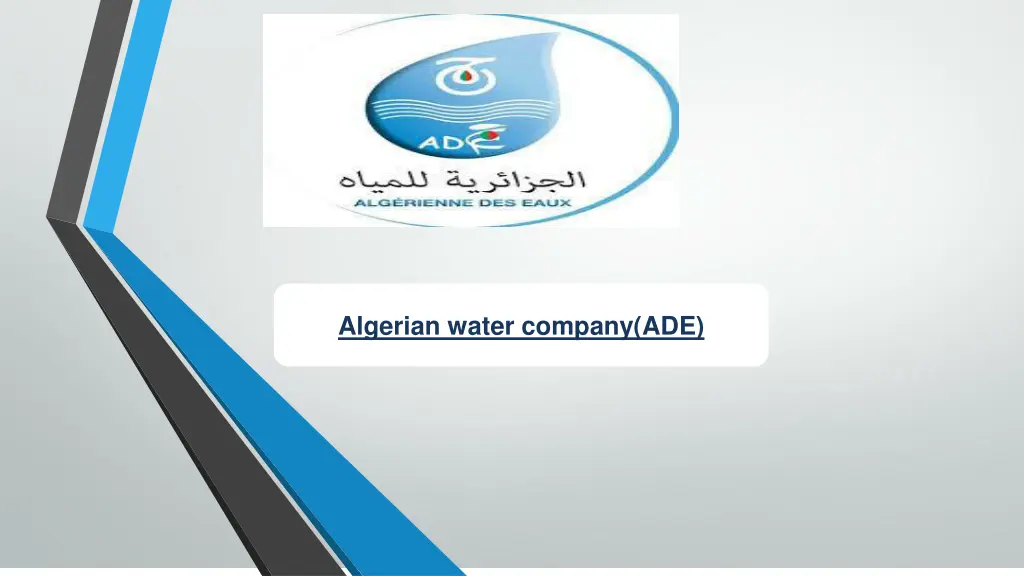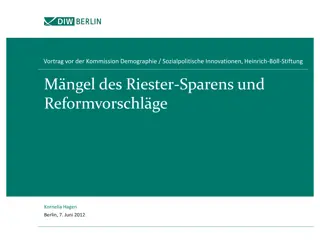
Algerian Water Company (ADE) and Water Sector Development
The Algerian Water Company (ADE) plays a pivotal role in distributing potable water in Algeria, supported by the government's efforts to enhance the water sector through infrastructure projects and purification processes. Learn about the organization, stages of water collection, and purification methods implemented by ADE for providing high-quality water to citizens.
Download Presentation

Please find below an Image/Link to download the presentation.
The content on the website is provided AS IS for your information and personal use only. It may not be sold, licensed, or shared on other websites without obtaining consent from the author. If you encounter any issues during the download, it is possible that the publisher has removed the file from their server.
You are allowed to download the files provided on this website for personal or commercial use, subject to the condition that they are used lawfully. All files are the property of their respective owners.
The content on the website is provided AS IS for your information and personal use only. It may not be sold, licensed, or shared on other websites without obtaining consent from the author.
E N D
Presentation Transcript
introduction The Algerian government gives significant attention to the water sector, allocating substantial financial and material resources for its development. This commitment is reflected in the completion of important projects such as dam construction, the implementation of major water transfer schemes, the expansion of water supply networks in urban and agricultural areas, and the establishment of seawater desalination plants. These efforts have contributed to increasing the volume of available water resources at the national level and improving supply conditions, especially in water-scarce regions.
Definitions: Definition and Organization of the Algerian Water Company (ADE): Algerian water company (ADE): is a public company responsible for the distribution of potable water to citizens residing in Algeria. It is a public institution with an industrial and commercial nature. It also undertakes the implementation of some important projects such as sanitation projects or those related to seawater desalination, which were launched in previous years with the aim of achieving self-sufficiency in terms of domestic, industrial, and agricultural consumption. The General Directorate of(ADE): is subdivided into 05 Regional Agencies covering the entire national territory according to the Hydrographic Basins. It operates through:" * "The Algiers Regional Agency;" * "The Oran Regional Agency;" * "The Chlef Regional Agency;" * "The Constantine Regional Agency;" * "The Tizi-OuzouRegional Agency." "The regional agencies are also subdivided into:" * "16 Zones" * "49 Units"
Stagesof Water Collection "The process of water filtration and purification in Algeria aims to produce high-quality water suitable for drinking and other uses by removing various types of impurities and pollutants present in raw water sources. This process involves several essential elements at each stage: "Raw Water Sources: Dams Rivers: Wells: Seawater Desalination:
This stage aims to remove various impurities and pollutants from raw water through several successive steps: A_Pre-treatment / Screening: * Coarse Screens * Grit Removal B_ Coagulation and Flocculation: * Chemical Addition: * Rapid Mixing: * Slow Mixing / Flocculation: * c. Sedimentation / Clarification: * Sedimentation Basins: * d. Filtration: * Sand Filters: * Activated Carbon Filters * Membrane Filters
* e. Disinfection: * Chlorination: * Chloramination: * Chlorine Dioxide: * Ozonation: * Ultraviolet (UV) Irradiation * f. Iron and Manganese Removal: * Oxidation * Filtration: * Ion Exchange * g. Additional Treatments: * pH Adjustment: * Fluoridation: Water Distribution: * Pipe Networks: * Distribution Reservoirs: * Quality Monitoring
"Healthy purification and filtration processes aim to remove or deactivate a wide range of physical, chemical, and biological impurities and pollutants present in various raw water sources, whether surface water (such as rivers, lakes, and dams), groundwater (such as wells), or even desalinated seawater. The methods used depend on the nature and quality of the raw water, the required health standards for the treated water, the available technology, and economic costs. "Healthy Methods for Water Purification and Filtration (in points): * Selecting raw water sources of better quality. * Applying a multiple barrier treatment system. * Ensuring effective disinfection with controlled dosage and residuals, and avoiding harmful byproducts. * Removing harmful chemical and physical pollutants. * Continuous monitoring of water quality and regular analysis. * Rapid response to any abnormal water quality results. * Proper maintenance and management of infrastructure (cleaning, leak repair, using safe materials). * Training and qualifying personnel responsible for operation and maintenance
Benefits of water filtration: Water filtration has many benefits, the most important of which are: * Improving water quality: Water filtration removes impurities and harmful substances such as sediments and pollutants, which improves its taste and odor and makes it safer to drink. * Protecting health: Water filtration reduces the risk of waterborne diseases, such as cholera and typhoid, by removing bacteria and viruses. * Conserving water: Water filtration helps in reusing polluted water, which reduces the consumption of clean water and preserves water resources. * Protecting the environment: Water filtration reduces environmental pollution by removing pollutants from water before it is discharged into the environment. * Saving energy: Water filtration helps reduce the energy needed to treat water, which lowers greenhouse gas emissions. Water filtration is considered an important step in preserving human health and the environment and contributes to ensuring the provision of clean water for all
In conclusion, it can be stated that water purification represents the cornerstone of the work of any Algerian water company seeking to achieve its fundamental objectives of providing potable water and water for other uses to citizens and institutions alike. Continuous investment in the development and modernization of treatment plants, the adoption of the latest technologies and international standards, and attention to operational efficiency and regular maintenance are not mere options but absolute necessities to ensure water quality and sustainability in the long term. Furthermore, it requires the concerted efforts of the company, government agencies, and civil society to raise awareness of the importance of preserving water resources and rationalizing their consumption, which effectively contributes to alleviating pressure on treatment plants and ensuring their ability to meet growing needs. The future of the water sector in Algeria depends significantly on the seriousness of water companies in adopting effective and sustainable purification strategies, capable of facing increasing environmental and climatic challenges, and achieving the desired water security for all Algerians
This practical application is the work of the students: 1_ROUIMEL MANEL. 2_ ALI MOUSSA DOUNYA 3_Baghdadi ayham

